|
|
|
Sort Order |
|
|
|
Items / Page
|
|
|
|
|
|
|
| Srl | Item |
| 1 |
ID:
132583
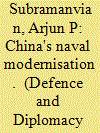

|
|
|
|
|
| Publication |
2014.
|
| Summary/Abstract |
India, throughout its existence, has remained a land power. India too has a rich martial tradition, but a tradition that is deeply entrenched in its threat perception which is primarily focussed on its northwestern border. The evolution of this mindset has its reasons; throughout its :history, almost all the invasions came from the northwestern border -through the passes in the Hindul
|
|
|
|
|
|
|
|
|
|
|
|
|
|
|
|
| 2 |
ID:
160636
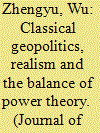

|
|
|
|
|
| Summary/Abstract |
Since the end of World War II, classical geopolitics as a particular form of realism has been disengaged from the development of mainstream realist theories. This disengagement has not only concealed the value of classical geopolitics as a framework of analysis for policy and strategy, but also created an increasing rift between theory and policy in contemporary realist theories. This paper seeks to reengage classical geopolitics with mainstream realist theories by clarifying its realist traits and analytical characteristics, (re)stating its core propositions and probing into its potential contribution to the development of mainstream realist theories. This paper contends that classical geopolitics, while having a distinctive pedigree, can arguably be considered an integral part of the family of realist theories in view of its basic theoretical assumptions concerning international anarchy, the unit of analysis and power politics. As a framework of analysis, classical geopolitics incorporates three interrelated strategic propositions. Those three propositions not only constitute the theoretical core of classical geopolitics, but also manifest a peculiar balance-of-power conception that is essentially distinct from those proposed by mainstream realist theories. This paper argues that those three propositions combined promise to fill in prominent lacuna in the balance-of-power research programme, and also have significant implications for contemporary world politics.
|
|
|
|
|
|
|
|
|
|
|
|
|
|
|
|
| 3 |
ID:
176231
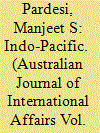

|
|
|
|
|
| Summary/Abstract |
The term ‘Indo-Pacific’ has now entered the strategic lexicon to refer to strategic Asia. In contrast to the dominant themes in the scholarly literature that emphasise its ‘newness’ and conceive it as a maritime space, I argue that Asia's three sub-regions (South, Southeast, and Northeast Asia) and two oceans (Indian and Western Pacific) have constituted a single strategic system for the past two centuries (with the notable exception of the last three decades of the Cold War). Importantly, future regional order in this ‘larger Asia’ will emerge from the interdependence of continental and maritime power. Approaching International Relations as an historical social science, I construct a new historical narrative to explain region (trans)formation. This larger strategic Asia that first emerged around the time of the ‘great divergence’ between the West and the rest was created by a rising Britain through its Indian base. While Cold War geopolitics ‘split’ Asia into smaller sub-regions, the rise of China and India is reversing this split. The contemporary re-emergence of the Indo-Pacific allows the United States to create a regional distribution of power and a regional distribution of status (through discourse) that favours the United States in an increasingly multipolar region.
|
|
|
|
|
|
|
|
|
|
|
|
|
|
|
|
| 4 |
ID:
167174


|
|
|
|
|
| Summary/Abstract |
This essay outlines a theory of land power. After explaining the absence of such a theory, the article establishes the modern context for such a theory, specifically within the concept of joint interdependence. The analysis defines key terms and premises behind the theory, to include a definition of land power. The argument then outlines the national elements of power that contribute to a theory of land power. The analysis next applies the theory to the fundamental purposes of military power: defeat, deter, compel, assure, shape and support to the nation. The analysis then tests key definitions, supporting premises, and utility of the theory. The essay argues that historical experience validates the applicability and utility of the theory, and offers a solid basis for extrapolating the validity of the theory into the near future.
|
|
|
|
|
|
|
|
|
|
|
|
|
|
|
|
| 5 |
ID:
142456


|
|
|
| 6 |
ID:
137729
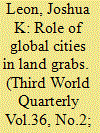

|
|
|
|
|
| Summary/Abstract |
Key trends link a globally connected urban archipelago and its hinterlands, warranting new studies of power in its most contemporary forms. This article locates land power and where that power is exercised – looking at the burgeoning global land rush from the perspective of cities. Urbanisation continues to drive vast political transitions, uprooting longstanding agrarian modes of living while creating myriad inequalities within cities. Are the world’s most powerful agglomerations active agents in this transformation? Answering affirmatively, the article reframes urbanisation as a vast, global geopolitical transfer of power from rural to urban. Leading global cities like New York, London, Hong Kong, Chicago and Singapore are not merely impressive collections of factor endowments. They are also sites of concentrated power with coercive influences beyond municipal boundaries. The article asks how cities project power in the contemporary global system. Juxtaposing data on global connectivity with the location strategies of private firms, we learn that the world’s most successful global cities are also sources of exploitative accumulations of land.
|
|
|
|
|
|
|
|
|
|
|
|
|
|
|
|
| 7 |
ID:
092900
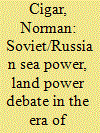

|
|
|
|
|
| Publication |
2009.
|
| Summary/Abstract |
The tumultuous change-or perestroika-after Mikhail Gorbachev came to power in 1985 opened the way for a wide-ranging debate on the most basic aspects of defense, and even of the country's very identity, including the age-old dilemma of whether the USSR/Russia is at heart a seapower or a landpower. The debate-which swirled around issues such as the country's geography, national interests, security threats, foreign policy, history, and the economy-highlighted the difficulty of balancing the country's orientation in these two basic realms. In its aftermath, the Navy underwent significant reductions in construction, training, and deployments. However, given the likely reassertion of Russian military activity in future years, these earlier arguments can provide a guidepost to a likely revived, albeit updated, debate by proponents of seapower or landpower.
|
|
|
|
|
|
|
|
|
|
|
|
|
|
|
|
|
|
|
|
|